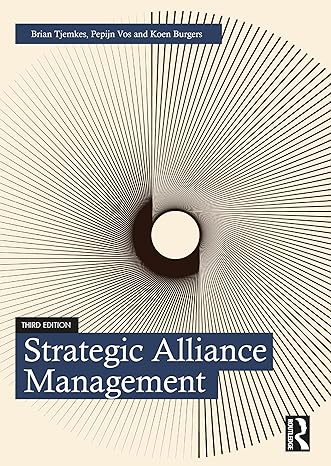In October 2016, the Dutch Organization for Applied Sciences (TNO) and the Technical University of Delft (TU
Question:
In October 2016, the Dutch Organization for Applied Sciences (TNO) and the Technical University of Delft (TU Delft) signed an alliance agreement for the initiation of Dutch Optic Centre (DOC). Against the background of internal development at TNO (for example, stagnation of fnancing existing RD activities in this feld) and external development (such as SMEs’ need to get affordable access to fundamental knowledge to realize their product innovation, and increased use of feld labs and government pressure to do more in public–
private partnerships), TNO decided to explore the possibilities of realizing their ambition by setting the DOC alliance together with TU Delft.
The DOC aims to boost Dutch industry in the feld of optics and opto-mechatronics by increasing the utilization of Dutch science through joint R&D. The Netherlands is unmatched in the feld of optics and opto-mechatronics, holding a leading position in science and industry.
The DOC is an innovation-oriented alliance consisting of knowledge institutes and more than 20 hi-tech companies from all over the Netherlands. The objective of DOC is to become an ambitious public–private partnership in the feld of optics and opto-mechatronics by 2020. It strives to realize three objectives. The frst is to develop (fundamental) knowledge focused on the long-term needs of companies. Second, it seeks to support and collaborate with companies to develop new products up to the highest technology readiness level and to introduce products on the markets. Finally, DOC aims to promote the DOC brand in 350 Alliance teams order to attract new R&D partners and also create an interesting environment for students and PhDs. TNO and TU Delft fulfl the leadership role and will be guided by the needs of the industry.
Before focusing on the functioning of the alliance set-up team, we will briefy explain the set-up process. In 2014, TNO started the process of setting up the DOC alliance. The period between 2014 and the start of 2016 can be characterized as the exploration phase. TNO and TU Delft explored the possibilities of creating a viable DOC alliance. This was done by holding meetings with internal and external stakeholders such as SMEs and the Ministry of Economic Affairs. During that period, more and more people started to believe in the power of concepts like feld labs, test beds, ecosystem thinking and joint innovation centres. This fostered the creation of a viable DOC alliance. Between the start of 2016 and October of that year, the alliance set-up team created a DOC website, defned the set of potential products/ service of the alliance, organized two network meetings with SMEs, aligned the interests of the Ministry of Economic Affairs and RVO with those of the DOC alliance partners and other stakeholders (such as SMEs), and developed a DOC business plan and a contract supported by top management of each partner. This resulted in the signing of a DOC alliance agreement on 19 October 2016.
Questions 1 The team representatives of TNO and TU Delft were primarily focused on continuing to make progress. They did take a little time to engage in team building. Explain why team building during the (pre)launch stage is critical to overcome post-launch impediments to alliance development.
2 Team composition changed over time as a new team member was added to the (pre)
launch team. Explain how team composition (and team-member skills) may afect alliance launch team functioning and how changes in team membership may positively or negatively afect team functioning.
Step by Step Answer:

Strategic Alliance Management
ISBN: 978-1032119250
3rd Edition
Authors: Brian Tjemkes ,Pepijn Vos ,Koen Burgers






